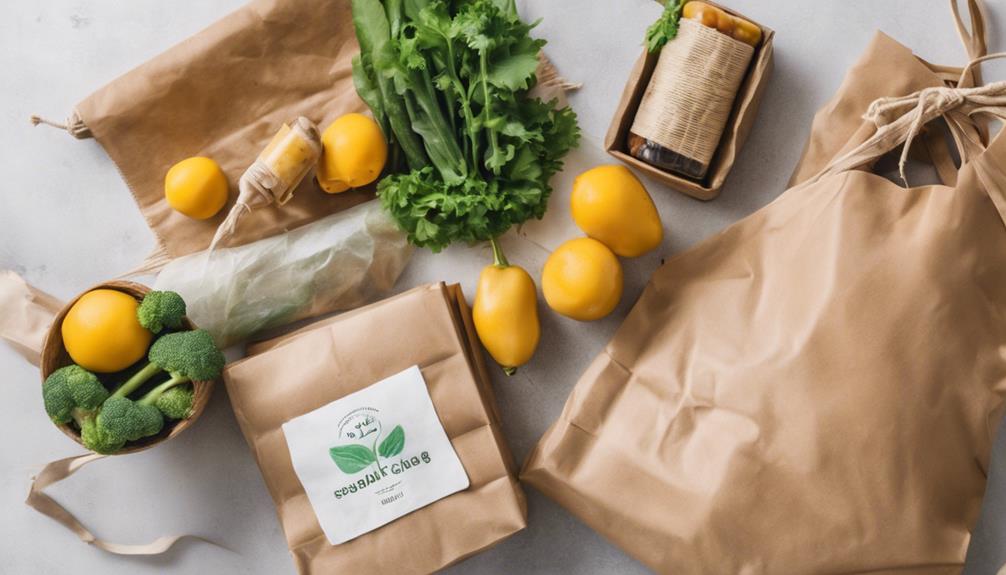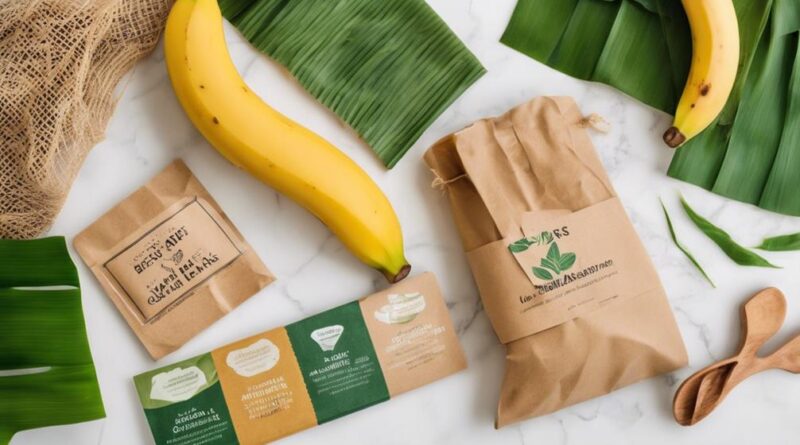Reducing Waste Through Natural Food Packaging: Top Tips
Embrace eco-friendly practices by opting for biodegradable, compostable, or recyclable materials for your food packaging. Prioritize reusability with containers made from glass or stainless steel to minimize waste. Reduce plastic pollution by choosing innovative options like edible packaging made from seaweed or beeswax wraps. Focus on sustainability and environmental consciousness to revolutionize your packaging choices. By making these smart decisions, you'll not only reduce waste but also contribute to a healthier planet. Explore further for more tips on organic packaging and advancements in sustainable materials to enhance your eco-friendly packaging journey.
Benefits of Natural Food Packaging
Discover how opting for natural food packaging can revolutionize your sustainability efforts and benefit the environment. By choosing cost-effective solutions and eco-friendly alternatives for packaging your food products, you can significantly reduce waste and lessen your environmental impact.
One of the key benefits of natural food packaging is its cost-effectiveness. Sustainable packaging options like biodegradable materials or reusable containers can often be more affordable than traditional plastic packaging in the long run. By investing in these eco-friendly alternatives, you not only contribute to a healthier planet but also save money for your business in the process.
Furthermore, natural food packaging offers eco-friendly alternatives that can help you minimize your carbon footprint. Materials like compostable packaging or recyclable containers are excellent choices to reduce waste and promote a more sustainable approach to packaging. By making the switch to these environmentally friendly options, you show your commitment to protecting the planet and inspire others to follow suit.
Incorporating cost-effective and eco-friendly packaging solutions into your business operations is a practical way to make a positive impact on the environment. By choosing natural food packaging, you're taking a significant step towards reducing waste, conserving resources, and creating a more sustainable future for generations to come.
Sustainable Materials for Packaging
To further enhance your sustainable packaging efforts and contribute to a greener environment, exploring the use of sustainable materials for packaging is a pivotal step forward. By opting for green alternatives and eco-friendly options, you can significantly reduce the environmental impact of your packaging choices.
One innovative option for sustainable packaging is using materials such as recycled paper or cardboard. These materials aren't only biodegradable but also easily recyclable, making them an excellent eco-conscious choice. Additionally, plant-based materials like bagasse (sugarcane fiber) or cornstarch offer biodegradable alternatives to traditional plastics, reducing the reliance on non-renewable resources.
Another practical approach is to consider using reusable packaging solutions. Reusable containers made from materials like glass or stainless steel can help minimize waste generation and promote a circular economy. Encouraging customers to return and refill these containers can further enhance the sustainability of your packaging practices.
When sourcing packaging materials, prioritize suppliers that offer compostable options made from natural fibers like hemp or bamboo. These materials break down easily without releasing harmful chemicals into the environment, providing a truly eco-friendly packaging solution. By incorporating these sustainable materials into your packaging strategy, you can make a positive impact on the planet while meeting the growing demand for environmentally responsible practices.
Reducing Plastic Waste in Packaging
Consider utilizing innovative biodegradable alternatives to traditional plastic packaging to minimize waste and promote sustainability in your packaging practices. By exploring alternative options, you can significantly reduce plastic waste and contribute to a healthier environment. Eco-conscious alternatives such as biodegradable plastics made from plant-based materials like corn starch or sugarcane offer a sustainable solution without compromising on quality or durability.
Switching to compostable packaging made from materials like bagasse, which is a byproduct of sugarcane processing, can also help in reducing plastic waste. These eco-friendly options break down naturally, leaving no harmful residues behind and reducing the burden on landfills. Moreover, they can be a cost-effective choice in the long run, as more companies embrace sustainable practices, driving prices down due to increased demand.
Investigating innovative packaging solutions like edible packaging made from seaweed or beeswax wraps can add a unique touch to your products while significantly cutting down on plastic waste. These creative alternatives not only reduce environmental impact but also appeal to eco-conscious consumers who prioritize sustainability.
Compostable Packaging Solutions
Embrace compostable packaging solutions to revolutionize your approach to sustainability in packaging and reduce environmental impact. By opting for biodegradable alternatives, you can significantly decrease the amount of waste produced by traditional packaging materials. Compostable packaging solutions offer a range of environmental benefits that make them an excellent choice for eco-conscious consumers and businesses alike.
One of the key advantages of compostable packaging is its ability to break down into natural materials like water, carbon dioxide, and biomass when composted. This process not only reduces the amount of waste sent to landfills but also helps enrich the soil, closing the loop on the packaging lifecycle. Additionally, compostable packaging can help reduce greenhouse gas emissions compared to traditional packaging materials, further contributing to a healthier environment.
When considering compostable packaging solutions, look for certifications like the Biodegradable Products Institute (BPI) certification to ensure that the products meet stringent compostability standards. These certifications guarantee that the packaging will break down efficiently in commercial composting facilities, further minimizing its environmental impact.
Incorporating compostable packaging solutions into your packaging strategy demonstrates a commitment to sustainability and can set you apart as a conscientious business. By making the switch to compostable packaging, you can play a vital role in reducing waste and protecting the environment for future generations.
Importance of Biodegradable Packaging
Biodegradable packaging offers a sustainable solution to reducing waste and minimizing environmental impact in the packaging industry. By choosing biodegradable options, you can actively contribute to a healthier planet while still meeting your packaging needs. Here are some key benefits of biodegradable packaging:
- Reduces Landfill Waste: Biodegradable packaging materials break down naturally over time, reducing the amount of waste that ends up in landfills.
- Lower Carbon Footprint: Eco-friendly options like biodegradable packaging often have a lower carbon footprint compared to traditional plastic packaging, helping to combat climate change.
- Supports Circular Economy: Biodegradable packaging supports the concept of a circular economy by ensuring that resources are used efficiently and can be regenerated naturally.
- Protects Ecosystems: Choosing biodegradable packaging helps protect ecosystems by reducing the harmful effects of plastic pollution on wildlife and marine life.
Incorporating biodegradable packaging into your operations not only benefits the environment but also aligns with the growing consumer demand for sustainable practices. Make a positive impact by opting for eco-friendly packaging solutions that prioritize the health of our planet.
Innovations in Eco-Friendly Packaging
With a focus on sustainability and environmental consciousness, new advancements in eco-friendly packaging are revolutionizing the way products are packaged and delivered. Companies are increasingly turning to biodegradable alternatives and eco-conscious options to reduce their environmental impact.
One of the innovative solutions gaining traction is packaging made from plant-based materials such as cornstarch, sugarcane fibers, or seaweed. These materials aren't only renewable but also biodegradable, offering a sustainable alternative to traditional plastic packaging. By utilizing these biodegradable alternatives, companies can significantly decrease the amount of non-recyclable waste entering landfills and oceans.
Another eco-conscious option that's becoming more popular is compostable packaging. These materials break down into organic matter when composted, reducing the burden on landfills and minimizing greenhouse gas emissions. Compostable packaging is a practical and sustainable choice for companies looking to enhance their eco-friendly initiatives.
In addition to using biodegradable and compostable materials, advancements in technology have led to the development of innovative packaging designs that minimize waste. For example, some companies are exploring reusable packaging options or incorporating edible packaging made from natural ingredients. These creative solutions not only reduce waste but also offer a unique and memorable customer experience.
Tips for Smart Packaging Choices

Making smart packaging choices is essential for minimizing waste and promoting sustainability in today's eco-conscious world. When selecting packaging for your products, consider the following tips to make eco-friendly decisions:
- Opt for Eco-Friendly Alternatives: Choose packaging materials that are biodegradable, compostable, or recyclable. Materials like paper, cardboard, cornstarch, and bamboo offer excellent eco-friendly options that reduce environmental impact.
- Embrace Minimalism: Keep packaging simple and minimal to reduce the amount of material used. Avoid excessive layers, unnecessary components, and oversized boxes to decrease waste and promote a more sustainable approach.
- Prioritize Reusability: Encourage customers to reuse packaging by designing it with a second life in mind. Utilize materials that can be easily repurposed or offer incentives for customers to return packaging for a refill or discount.
- Consider Green Packaging Strategies: Explore innovative green packaging strategies such as edible packaging, plant-based plastics, or mushroom packaging. These alternatives provide creative and sustainable solutions to traditional packaging challenges, reducing environmental impact and promoting a circular economy.
Impact of Organic Packaging on Environment
To minimize waste and enhance sustainability in your packaging choices, consider the environmental impact of utilizing organic materials for packaging your products. Eco-friendly solutions like organic packaging can have a significant positive impact on the environment. When you opt for organic packaging made from materials such as recycled paper, biodegradable plastics, or compostable plant-based materials, you're choosing a more sustainable option that reduces the reliance on non-biodegradable materials.
The environmental impact of organic packaging extends beyond just the materials used. By utilizing organic packaging, you contribute to reducing the amount of plastic waste that ends up in landfills and oceans. This simple switch to eco-friendly solutions can help lower your carbon footprint and lessen the harmful effects of traditional packaging on the ecosystem.
Moreover, organic packaging often has a lower energy requirement during production compared to conventional packaging materials, further reducing its environmental impact. By choosing organic packaging, you aren't only making a more sustainable choice for the environment but also supporting the development and growth of eco-friendly alternatives in the packaging industry.
Conclusion
Make a positive impact on the environment by choosing natural food packaging options. Opt for sustainable materials, reduce plastic waste, and embrace compostable and biodegradable packaging solutions.
Stay informed about innovations in eco-friendly packaging and make smart choices to reduce waste. By incorporating organic packaging into your daily life, you can contribute to a healthier planet for future generations.
Let's work together to make a difference through conscious packaging choices.
